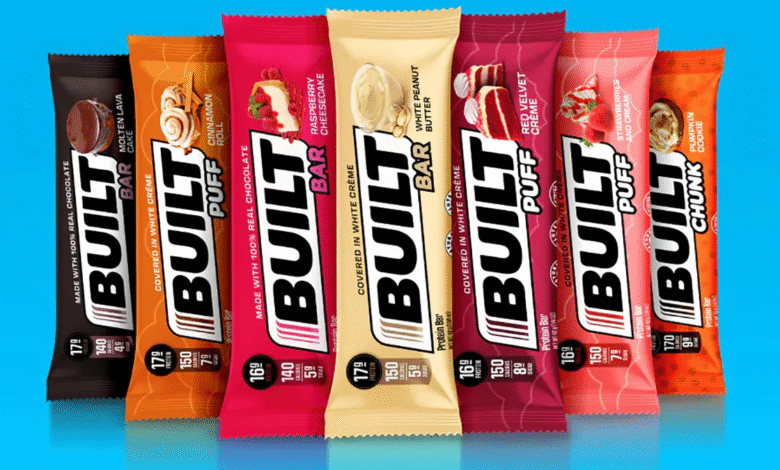The Built Bar Controversy: What Really Went Wrong with Everyone’s Favorite Protein Bar

Explore the full story behind the Built Bar controversy: formula changes, customer backlash, quality concerns, and the brand’s attempt to recover. Honest, expert-level insight.
The Built Bar controversy has stirred up quite a buzz in the health and fitness community, and honestly, it’s not surprising. When a brand becomes as popular and influential as Built Bar, people are going to have opinions. Some love the brand passionately for its innovative approach to protein bars, while others are not so kind with their feedback. From formulation changes to customer service issues, the controversy is layered and worth diving into.
The Rise of Built Bar: From Favorite to Flawed?
Built Bar exploded onto the protein snack scene with what seemed like an unbeatable formula: high protein, low sugar, and flavors that tasted like actual candy bars. For fitness enthusiasts and casual dieters alike, this was a dream come true. The soft texture, covered in real chocolate, and macro-friendly profile made it an instant hit. People were raving about it on YouTube, Instagram, and Reddit.
But as the brand grew, things began to shift. Built Bar reformulated their bars, allegedly to improve shelf life and texture. Some users welcomed the change, but many others claimed the new recipe compromised taste and consistency. The backlash was swift, with forums and comment sections filled with frustrated longtime customers. The controversy grew as more customers claimed the new bars were chalky, overly chewy, or even had a strange chemical aftertaste.
What Sparked the Built Bar Controversy?
The core of the Built Bar controversy began with a formula change that left many consumers confused and disappointed. One of the original selling points of Built Bars was their unique, marshmallow-like texture. This feature was what set them apart from the dense and often gritty texture of traditional protein bars.
When Built Bar launched their updated formula, they claimed it would enhance flavor and fix previous issues like melting during shipping. However, this new version turned out to be a dealbreaker for many loyal fans. Reports of the bars being harder, less flavorful, and more artificial in taste started rolling in. It wasn’t just about taste; for some, it was about trust. Customers felt betrayed, like the brand had prioritized production efficiency over consumer satisfaction.
Social Media Backlash and Public Outcry
Social media played a huge role in amplifying the Built Bar controversy. On Reddit threads and Facebook groups, discussions around the reformulated bars went viral. Influencers who previously praised the bars started to express their disappointment, and some even severed their partnerships with the company.
There were also concerns about transparency. Customers complained about a lack of communication from the company regarding changes in the ingredient list and manufacturing process. Others pointed out that the updated bars contained more artificial ingredients, which contradicted Built Bar’s earlier image of being a clean, healthy option.
Quality Control and Customer Complaints
Another wave of controversy came with increasing complaints about quality control. Customers reported receiving melted bars, inconsistencies in texture, and even packaging issues. Built Bar did address some of these concerns by changing their shipping materials and offering refunds or replacements, but the damage to the brand’s reputation had already begun.
Some users claimed that their complaints to customer service were met with delayed responses or dismissive attitudes. In an era where customer experience is everything, these reports did not sit well with the broader community. The brand started to appear less like a startup that cared about its community and more like a corporation focused on the bottom line.
The Role of Influencers in Fueling the Controversy
Fitness influencers played a pivotal role in both the rise and the controversy of Built Bar. Initially, these influencers were instrumental in introducing Built Bars to the masses. Their genuine excitement and rave reviews made the bars seem like a must-have snack for anyone into fitness.
However, when the formula changed, the influencers were put in a tough spot. Some continued to promote the bars without addressing the backlash, leading to accusations that they were prioritizing affiliate income over honesty. Others took a stand and publicly distanced themselves from the brand, adding fuel to the fire.
Built Bar vs. Competitors: Did They Lose Their Edge?
Before the controversy, Built Bar had very little competition in their niche. Their chocolate-covered bars with unique flavors and excellent macros made them an obvious choice. But with the new changes, many customers began to explore other options.
Brands like Quest, ONE, and Barebells started gaining more attention. These alternatives offered comparable macros and, according to some users, better taste and consistency. The shift in consumer loyalty raised questions about whether Built Bar could maintain its place in the market or if it had permanently damaged its brand.
Nutrition Profile: Still Worth the Hype?

One of the main selling points of Built Bar has always been its nutrition profile. High protein, low sugar, low calories – it checks all the boxes. Even after the formula change, the macros remained fairly solid.
But some critics argue that the increase in artificial sweeteners and preservatives could make the bars less appealing to health-conscious consumers. While Built Bars still look good on paper, the actual experience of eating them has become more divisive.
Customer Loyalty and Brand Trust
Trust is everything in a brand-consumer relationship. When a company grows quickly, it’s easy for them to lose sight of what made them successful in the first place. Built Bar’s handling of the controversy has shown both strengths and weaknesses in this area.
On the positive side, they have tried to address concerns through updates, refunds, and new launches. But many feel it’s too little, too late. Once consumer trust is broken, it’s incredibly hard to earn it back, especially in a crowded market.
Are Built Bars Still a Good Option?
It really depends on what you’re looking for. If you’re focused strictly on macros and can tolerate a range of flavors and textures, Built Bars might still work for you. But if taste and consistency matter as much as nutritional content, you might find better options elsewhere.
The best approach is probably to try a sample pack and see for yourself. Everyone’s taste is different, and what one person finds inedible, another might genuinely enjoy. Built Bar controversy or not, personal preference plays a huge role here.
The Future of Built Bar: Can They Bounce Back?
Rebuilding a damaged brand is never easy, but it’s not impossible. Built Bar still has a loyal following, and if they can learn from their mistakes, they could regain their reputation.
This would likely involve better communication, more transparency, and maybe even a return to their original formula or at least offering it as a legacy line. The controversy has been a wake-up call, and it’s up to Built Bar to decide what kind of company they want to be moving forward.
FAQs
What is the Built Bar controversy about? The Built Bar controversy mainly stems from a formula change that disappointed many loyal customers. Complaints include altered taste, texture, and a lack of transparency from the company.
Why did Built Bar change its formula? Built Bar claimed the change was to improve shelf life and overall product quality, but many fans felt it compromised the original taste and texture that made the bars popular.
Are Built Bars still healthy? Nutritionally, Built Bars still offer high protein and low sugar, but the inclusion of more artificial ingredients has raised concerns among some health-focused consumers.
Have influencers responded to the Built Bar controversy? Yes, many influencers have voiced their disappointment, and some have even ended partnerships with the brand, citing a loss of trust and product quality.
Is Built Bar doing anything to fix the issues? The company has acknowledged some problems and offered refunds or replacements. However, many feel their responses haven’t been enough to rebuild trust.
Are there better alternatives to Built Bar? Several brands like Quest, Barebells, and ONE have gained popularity, especially among those who were unhappy with Built Bar’s new formula.
Conclusion
The Built Bar controversy is a prime example of how quickly public opinion can shift, especially in the age of social media. While the bars still hold nutritional value, the dissatisfaction with taste, texture, and brand transparency has left a sour note for many. Whether Built Bar will bounce back depends on their willingness to listen to feedback and take meaningful action. For now, it remains a polarizing topic in the world of fitness snacks, and only time will tell where the brand lands.





